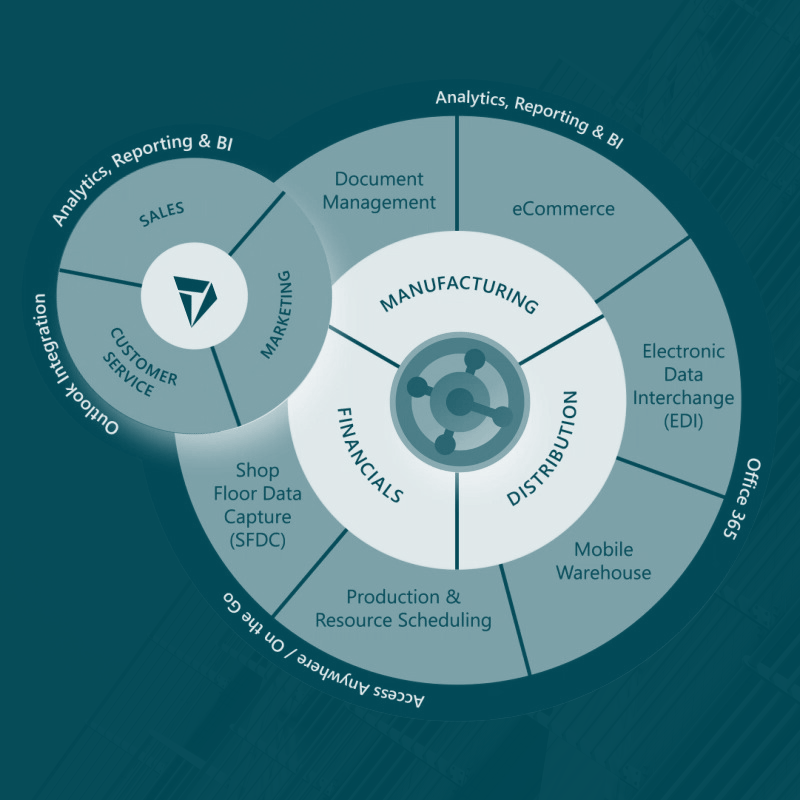
Exploring the ERP Capabilities of Microsoft Business Central
Microsoft Dynamics 365 Business Central stands as a comprehensive solution designed for small and medium-sized enterprises (SMEs), marking a significant evolution in ERP (Enterprise Resource Planning) systems. It emerges as a successor to Microsoft Dynamics NAV, exemplifying the integration of finances, operations, sales, and customer service on a single, cloud-based platform, answering the critical question: Is Microsoft Business Central an ERP system?
This article embarks on an exploration of Microsoft Business Central’s ERP capabilities, from its robust functionalities extending through financial management, and inventory management, to project management and beyond. It delves into how Business Central, part of the dynamic Microsoft Dynamics 365 suite, equips businesses with the automation and efficiency needed to navigate the complexities of today’s market.
Defining ERP Systems
At the core of modern business operations lies Enterprise Resource Planning (ERP) systems, sophisticated platforms designed to streamline and manage a plethora of business processes. These systems are architected around a unified data structure, with a common database at their heart, ensuring data consistency across an organisation. Here’s a closer look at the defining aspects of ERP systems:
- Integrated Management of Core Business Processes: ERP systems are pivotal in managing various domains such as financial management, human resources, supply chain management, and manufacturing, fostering an environment of seamless operational flow.
- Centralised Data Hub: Serving as the central repository for all organisational data, ERP systems eliminate data silos by connecting different departments. This integration allows for an end-to-end workflow, enabling departments to access and share relevant information efficiently.
- Customisation and Flexibility: Tailored to support functions across businesses of all sizes, ERP systems offer industry-specific customisations. This adaptability extends to cloud ERP solutions, which bring additional benefits including increased productivity, flexibility, and access to next-generation technology.
ERP systems transcend mere financial management; they encapsulate a broad spectrum of business functions, enabling transparency, data integrity, and operational excellence. By automating and optimising core business processes, ERP software plays a crucial role in enhancing organisational efficiency and agility, laying the foundation for sustained growth and competitiveness in the dynamic business landscape.
Overview of Microsoft Business Central
Microsoft Dynamics 365 Business Central emerges as a beacon for small and medium-sised businesses seeking a comprehensive ERP solution. At its core, Business Central streamlines processes across finance, operations, sales, service, and supply chain management. Recognised by Forbes Advisor as the best ERP system of 2023, it stands out for its global reach, supporting multiple currencies, languages, and regulatory standards, making it a versatile choice for businesses worldwide.
- Deployment Flexibility: Available in Essentials and Premium configurations, Business Central offers deployment options that cater to varying business needs, including on-premises, hybrid, and cloud, ensuring businesses can select the model that best fits their operational requirements.
- Integration and Automation: Seamlessly integrating with Microsoft 365 applications, Business Central enhances productivity by reducing manual data entry and application switching. Its use of AI and automated workflows further streamlines business processes, facilitating quicker decision-making and task completion.
- Security and Compliance: Prioritising data protection, Business Central offers world-class identity protection, role-based access, and encryption, ensuring businesses meet regulatory compliance effortlessly. Additionally, real-time dashboards and flexible reporting tools empower users with actionable insights, eliminating data silos.
With its adaptability, user-centric design, and robust functionality, Microsoft Dynamics 365 Business Central positions itself as a preferred ERP solution for modern enterprises. Its cloud-based nature reduces the need for costly on-premises IT infrastructure, while personalisation features like customisable dashboards and reports cater to specific business needs. Despite its many advantages, potential users should consider aspects such as scalability for larger enterprises and reliance on third-party add-ons. Starting at £54.83 per user/month, Business Central offers a cost-effective solution for businesses aiming to optimise their operations and scale efficiently.
Microsoft Business Central’s ERP Functionalities

Microsoft Business Central’s ERP functionalities are designed to streamline and optimise various aspects of business operations, making it a comprehensive solution for enterprises. These functionalities are categorised into core areas, each tailored to enhance efficiency and performance across different business processes.
- Financial Management: End-to-end management of finances, including budget oversight, accelerated closing processes, and automated bank reconciliation. Centralised financial data facilitates enhanced productivity for financial teams, supporting tasks like auditing, budgeting, and forecasting.
- Sales and Service Management: Management of the entire sales process within Outlook, improving sales cycle efficiency with lead prioritisation based on revenue potential. Basic CRM functionalities for service calls, personnel assignment, and service estimates, driving customer satisfaction and loyalty.
- Project and Supply Chain Management: Project management is supported with functionalities for budgeting, progress monitoring, resource allocation, and timesheet management.
Supply chain optimisation includes vendor and inventory management, replenishment based on actual demand, and AI-powered sales forecasting.
Integrating seamlessly with Microsoft 365 applications and other Microsoft technologies, Microsoft Business Central boosts productivity, automates processes, and facilitates data-driven decisions. The platform’s global operations support, including multiple currencies, languages, and regulatory standards, underscores its capability to cater to a diverse range of enterprises. With its user-friendly design, robust mobile apps, and extensive support network, Microsoft Business Central empowers businesses to navigate the complexities of modern markets efficiently.
Core Features of Microsoft Business Central as an ERP System
At the heart of Microsoft Dynamics 365 Business Central’s prowess as an ERP system are its core features, designed to empower businesses with a comprehensive, integrated solution. Here’s a closer look at these features:
- Adaptability Across Devices and Platforms: Compatible with a variety of devices and cloud platforms, ensuring accessibility and flexibility. Optimised for multiple AI hardware platforms, including NVIDIA GPUs and Google Cloud TPUs, facilitating seamless operations.
- Advanced AI and Machine Learning Capabilities: Offers Gemma models (2B and 7B sizes) with pre-trained and instruction-tuned variants for enhanced performance. Supports integration with popular tools such as Hugging Face and NVIDIA NeMo, alongside compatibility with major frameworks like JAX, PyTorch, and TensorFlow through native Keras 3.0.
- Responsible AI Use and Customisation: Includes a Responsible Generative AI Toolkit, guiding the creation of safer AI applications with a focus on ethical principles. Open for customisation with prebuilt apps from Microsoft AppSource, allowing businesses to tailor the solution to their specific needs.
These features, along with the solution’s user-friendly interface and the ability to conduct business without silos, provide actionable insights and a framework designed to evolve alongside the business. The collaboration with NVIDIA for optimisation and the partnership with Vertex AI for a broad MLOps toolset highlight Microsoft Business Central’s commitment to leveraging cutting-edge technology for business growth and efficiency.
Comparing Microsoft Business Central to Traditional ERP Systems
When comparing Microsoft Business Central (BC) to traditional ERP systems, it’s essential to understand their target markets and core functionalities. Below is a comparative analysis highlighting key distinctions:
- Target Market and Complexity:
- BC: Best suited for small to medium-sized businesses with simpler manufacturing processes.
- Finance & Supply Chain Management (F&SCM): Ideal for medium to large companies with complex manufacturing processes, handling a large number of legal entities or transactions, and designed for international businesses.
- Core Functionalities:
- BC: Offers financial management, inventory management, sales, purchasing, and service management.
- F&SCM: Provides additional functionalities like project management and human resources.
- Oracle ERP: Known for advanced financial management tools, regulatory compliance features, and a centralised location for managing business processes with real-time dashboards.
User Sentiment:
- Oracle ERP: Holds a user sentiment of 82% based on 671 reviews.
- Dynamics 365 Business Central: Has a user sentiment of 75% based on 366 reviews, indicating a strong but slightly lower satisfaction compared to Oracle ERP.
This comparative analysis showcases the diverse capabilities and target audiences of Microsoft Business Central compared to traditional ERP systems like Oracle ERP and Dynamics 365 F&SCM, underscoring the importance of aligning business needs with the appropriate ERP solution.
Comparative Analysis with Traditional ERP Systems

Implementing an ERP system is a significant undertaking for any business, marked by its complexity and the need for meticulous planning. The journey towards ERP implementation encompasses several critical stages, each playing a pivotal role in ensuring the success and efficiency of the system within the organisational structure. Microsoft Dynamics 365 Business Central (BC) and Microsoft Dynamics 365 Finance and Supply Chain Management (F&SCM) are exemplary models within the Digital Operations Platform (DOP) concept, showcasing the seamless integration and innovative capabilities that modern businesses seek in ERP solutions.
ERP Implementation Phases and Best Practices:
- Preparation and Planning: Involves setting clear project objectives, securing top management support, and establishing realistic expectations.
- Consultation and Customisation: Tailoring the ERP system to fit the unique needs of the business through expert consulting services.
- Training and User Involvement: Ensuring adequate resources are allocated for comprehensive user training, fostering user involvement for smoother adoption.
- Phased Implementation and Review: Adopting a phased approach to implementation, with prototyping and pilot testing, followed by change management and post-implementation review to assess and refine the system.
Risks and Success Factors:
- Risks: Include potential project failure, cost overruns, and operational disruptions, highlighting the importance of thorough planning and risk management.
- Success Factors: Emphasise the importance of data quality, adequate resources, and continuous user involvement, alongside the strategic support from top management.
Innovative Features of Microsoft Dynamics 365 Business Central:
- Seamless Integration: BC’s compatibility with Microsoft 365 allows for efficient business process management using a single, comprehensive solution.
- Artificial Intelligence: Employs AI for automation, accurate business decision-making through data analysis, and trend forecasting.
- Continuous Innovation: Regular updates enhance user convenience by providing access to the latest solutions, positioning BC not just as a tool but as a platform that promotes innovation in business technology.
By understanding these facets of ERP implementation and the unique offerings of Microsoft Dynamics 365 Business Central, businesses can navigate the complexities of digital transformation with greater ease and confidence, leveraging technology to drive operational efficiency and innovation.
Conclusion
Throughout this exploration of Microsoft Dynamics 365 Business Central and its pivotal role within the realm of ERP systems, we have ventured into the world where technology and efficiency converge to elevate modern enterprises. Business Central not only exemplifies the transformative potential of integrated financial, operational, sales, and customer service platforms but also stands as a testament to the significant advancements in cloud-based ERP solutions. By centralising data and automating core business processes, Microsoft Business Central empowers small and medium-sized enterprises with the agility, insights, and operational excellence necessary to thrive in today’s competitive market landscape.
Acknowledging the importance of seamless implementation and expert support for optimising these advanced ERP capabilities, businesses looking towards digital transformation will find invaluable partnership with established Microsoft Partners.
Carbon and Finch exemplify such collaboration, offering first-class implementation and support capabilities for Microsoft Dynamics solutions. As enterprises continue to navigate the complexities of digital transformation, the strategic application of Microsoft Business Central, coupled with expert guidance, provides a clear pathway to achieving sustained growth and efficiency in an ever-evolving business environment.
FAQs
What is Microsoft Business Central’s ERP? Microsoft Business Central’s ERP (Enterprise Resource Planning) is a comprehensive system designed to automate and streamline business processes across various departments such as finance, manufacturing, retail, supply chain, human resources, and operations.
What functions can Microsoft Dynamics 365 ERP perform? Microsoft Dynamics 365 ERP is equipped with a range of application modules to enhance business operations, including finance, fraud protection, supply chain management, project operations, project service automation, and sales.
Could you explain the ERP system within Microsoft? The ERP system within Microsoft refers to Enterprise Resource Planning software that assists organisations in automating and managing their core business processes to achieve optimal performance.
Can you define Microsoft Business Central? Microsoft Dynamics 365 Business Central is a cloud-based, all-encompassing business management solution that allows customers to move on from basic accounting software or outdated ERP systems to a unified solution that handles finances, operations, sales, and customer service.




